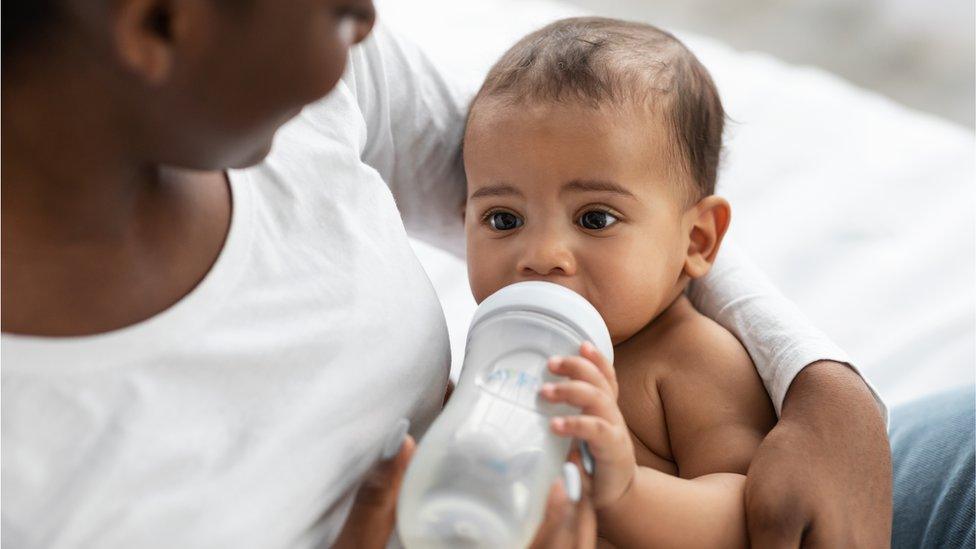Baby formula milk prices to be investigated over cost concerns
- Published
- comments

The UK infant formula market is under investigation after regulators said parents could be saving £500 in their baby's first year.
An initial report in November found the price of formula had risen by 25% over two years.
The Competition and Markets Authority (CMA) said that while prices had fallen a little, they remained "at historically high levels".
Just two companies - Danone and Nestle - control the majority of the market.
The formal investigation means that the regulator can use its legal powers to compel companies to hand over information. Previously, it had to rely on firm providing information voluntarily.
The biggest seller of baby milk in the UK is Danone, which produces Aptamil and Cow & Gate, and has 71% of the market. Nestle, which makes SMA, is the second-largest with 14% of the market.
Sarah Cardell, chief executive of the CMA, said the regulator was concerned that parents were not being given the information they needed to make informed choices over which milk to buy and that the market wasn't functioning in way to prompt suppliers to offer lower prices.
"We are determined to ensure this market is working well for the many new parents who depend on infant formula," she said.
The investigation could result in recommendations to government to change the way formula is marketed and the information provided to parents.
Nestle said it welcomed the review of the industry.
"This is a complex and serious issue and we are open to all constructive dialogue to help parents in the most effective way possible," a spokesperson said.
"Our goal has always been to keep products affordable and accessible for parents while still paying fair prices to our suppliers, including farmers. There have been significant increases in costs but we have been working to cut our costs wherever possible and only increase prices as a last resort and we are confident we have delivered on this," they added.
Danone said it it looked forward to continuing its cooperation with the CMA as the competition watchdog conducted its in-depth study of the market.
The CMA's initial report last year found that branded suppliers of formula had increased prices by more than their costs had risen.
Shoppers usually switch to cheaper brands when they are available, but this has not happened in the market for baby formula, the CMA found.
The competition watchdog's study will look at what is making consumers reluctant to switch and whether they are getting the right information about what they are buying.
It will also look at the barriers to new suppliers entering the market, as increased competition could help bring down prices.
It plans to publish a final report in September.
The nutritional value of baby milk is strictly regulated. As a result baby milk products do not differ much in core ingredients.
Consumer group Which? says therefore claims such as "closest to breast milk" or "complete nutrition" are meaningless.
Regulations also prevent discounting formula milk or advertising it to the public, to avoid undermining breastfeeding, which is better for babies' health.

Are you struggling to afford formula? Share your experiences by emailing haveyoursay@bbc.co.uk, external.
Please include a contact number if you are willing to speak to a BBC journalist. You can also get in touch in the following ways:
WhatsApp: +44 7756 165803
Tweet: @BBC_HaveYourSay, external
Please read our terms & conditions and privacy policy
If you are reading this page and can't see the form you will need to visit the mobile version of the BBC website to submit your question or comment or you can email us at HaveYourSay@bbc.co.uk, external. Please include your name, age and location with any submission.
Related topics
- Published10 January 2024

- Published15 January 2024

